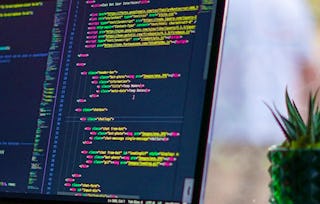Organisations all around the world are using data to predict behaviours and extract valuable real-world insights to inform decisions. Managing and analysing big data has become an essential part of modern finance, retail, marketing, social science, development and research, medicine and government.


Foundations of Data Science: K-Means Clustering in Python


Foundations of Data Science: K-Means Clustering in Python



Instructors: Professor Matthew Yee-King
76,760 already enrolled
Included with
734 reviews
Recommended experience
What you'll learn
Define and explain the key concepts of data clustering
Demonstrate understanding of the key constructs and features of the Python language.
Implement in Python the principle steps of the K-means algorithm.
Design and execute a whole data clustering workflow and interpret the outputs.
Skills you'll gain
Details to know

Add to your LinkedIn profile
See how employees at top companies are mastering in-demand skills

There are 5 modules in this course
This week we will introduce you to the course and to the team who will be guiding you through the course over the next 5 weeks. The aim of this week's material is to gently introduce you to Data Science through some real-world examples of where Data Science is used, and also by highlighting some of the main concepts involved.
What's included
9 videos4 assignments3 discussion prompts
What's included
11 videos4 readings10 assignments1 peer review1 ungraded lab
What's included
16 videos10 readings15 assignments
What's included
8 videos6 readings7 assignments1 peer review
What's included
9 videos3 readings3 assignments3 peer reviews5 discussion prompts
Instructors


Explore more from Machine Learning
 Status: Free Trial
Status: Free TrialUniversity of London
 Status: Free Trial
Status: Free Trial Status: Preview
Status: PreviewUniversity of Leeds
 Status: Free Trial
Status: Free TrialGoogle
Why people choose Coursera for their career

Felipe M.

Jennifer J.

Larry W.

Chaitanya A.
Learner reviews
- 5 stars
72.61%
- 4 stars
20.02%
- 3 stars
4.35%
- 2 stars
1.08%
- 1 star
1.90%
Showing 3 of 734
Reviewed on Jun 28, 2020
Very interesting course! The lecturers explain concepts thoroughly which makes the concepts easy to understand even for people without much knowledge in Data Science
Reviewed on Jun 29, 2020
A well presented and interesting course. It would have been good to have some more complex examples with the thinking behind them - the exploratory bit/intelligent bit of the process.
Reviewed on Feb 12, 2025
The content is beginner-friendly and gives students the tools they need to begin understanding how to use Python for Data Science.

Open new doors with Coursera Plus
Unlimited access to 10,000+ world-class courses, hands-on projects, and job-ready certificate programs - all included in your subscription
Advance your career with an online degree
Earn a degree from world-class universities - 100% online
Join over 3,400 global companies that choose Coursera for Business
Upskill your employees to excel in the digital economy
Frequently asked questions
To access the course materials, assignments and to earn a Certificate, you will need to purchase the Certificate experience when you enroll in a course. You can try a Free Trial instead, or apply for Financial Aid. The course may offer 'Full Course, No Certificate' instead. This option lets you see all course materials, submit required assessments, and get a final grade. This also means that you will not be able to purchase a Certificate experience.
When you purchase a Certificate you get access to all course materials, including graded assignments. Upon completing the course, your electronic Certificate will be added to your Accomplishments page - from there, you can print your Certificate or add it to your LinkedIn profile.
Yes. In select learning programs, you can apply for financial aid or a scholarship if you can’t afford the enrollment fee. If fin aid or scholarship is available for your learning program selection, you’ll find a link to apply on the description page.
More questions
Financial aid available,
¹ Some assignments in this course are AI-graded. For these assignments, your data will be used in accordance with Coursera's Privacy Notice.




